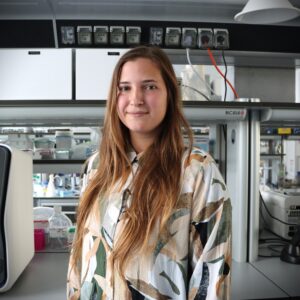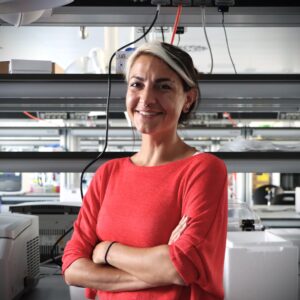
Iorio Group
Iorio group’s Apps, Tools and Computable Manuscripts
Lo Iorio Group lavora tra biologia, machine learning, statistica e teoria dell’informazione con l’obiettivo di comprendere e prevedere il ruolo delle alterazioni genomiche e dei tratti molecolari derivanti da altre -omiche nei processi patologici, nel ri-cablaggio dei circuiti biologici e il loro impatto sulla risposta terapeutica nei tumori umani e in altre malattie.
La nostra ricerca mira a migliorare la salute umana sviluppando algoritmi, strumenti di calcolo e nuovi metodi analitici per l’integrazione e l’analisi di set di dati di farmacogenomica e genomica funzionale, con l’obiettivo di identificare nuovi target terapeutici, biomarcatori e opportunità per il riposizionamento dei farmaci.
Con i nostri collaboratori, stiamo contribuendo alla creazione di una mappa completa di tutte le dipendenze genetiche e le vulnerabilità dei tumori umani e allo sviluppo di un’infrastruttura computazionale per tradurre questa mappa in linee guida per le fasi iniziali dello sviluppo di farmaci e per la medicina di precisione.
Sviluppiamo, implementiamo e gestiamo metodi bioinformatici e nuovi strumenti per la valutazione di modelli preclinici, la pre-elaborazione, l’analisi e la visualizzazione di dati provenienti da screening di genome-editing, per la correzione in silico di bias specifici in tali dati e per l’ottimizzazione di librerie di RNA a guida singola per screenings CRISPR-Cas9 aggregati e altri setting sperimentali.
Il nostro interesse è anche rivolto all’analisi di big-data, allo sviluppo di modelli predittivi biomedici basati su dati non biomedici, e a strategie informatiche efficienti per la randomizzazione vincolata utile a testare proprietà combinatorie in reti biologiche e dati genomici su larga scala.
Membri del gruppo
-
 Francesco Iorio
Francesco Iorio
Research Group Leader -
 Lorenzo Mathieu Brochier
Lorenzo Mathieu Brochier
PhD Student -
 Ottavio Croci
Ottavio Croci
Senior Data Scientist -
 Alessandro Digilio
Alessandro Digilio
Undergraduate Intern -
 Raffaele Iannuzzi
Raffaele Iannuzzi
PhD Student -
 Athanasios Oikonomou
Athanasios Oikonomou
Postdoc -
 Flavio Passante
Flavio Passante
PhD Student -
 Ludovica Proietti
Ludovica Proietti
Research Fellow -
 Nevenka Radic
Nevenka Radic
Postdoc -
 Aurora Savino
Aurora Savino
Postdoc -
 Vanessa Spagnolo
Vanessa Spagnolo
Technician -
 Yasin Tepeli
Yasin Tepeli
Scientific Visitor -
 Alessandro Vinceti
Alessandro Vinceti
Postdoc -
 Gianluca Vozza
Gianluca Vozza
Postdoc
Pubblicazioni
-
08/2024 - Blood
An unbiased lncRNAs dropout CRISPR-Cas9 screen reveals RP11-350G8.5 as a novel therapeutic target for Multiple Myeloma
Key Points We unveiled 8 lncRNAs essential for Multiple Myeloma (MM) cell fitness and associated with poor prognosis and high expression in MM patients We identified lncRNA RP11-350G8.5 as a therapeutic target for MM and characterised its oncogenic role, molecular and structural features Multiple Myeloma (MM) is an incurable malignancy characterised by altered expression of […]
-
07/2024 - Genome Biology
A benchmark of computational methods for correcting biases of established and unknown origin in CRISPR-Cas9 screening data
Background CRISPR-Cas9 dropout screens are formidable tools for investigating biology with unprecedented precision and scale. However, biases in data lead to potential confounding effects on interpretation and compromise overall quality. The activity of Cas9 is influenced by structural features of the target site, including copy number amplifications (CN bias). More worryingly, proximal targeted loci tend […]
-
07/2024 - Nature Communications
Distinct genetic liability profiles define clinically relevant patient strata across common diseases
Stratified medicine holds great promise to tailor treatment to the needs of individual patients. While genetics holds great potential to aid patient stratification, it remains a major challenge to operationalize complex genetic risk factor profiles to deconstruct clinical heterogeneity. Contemporary approaches to this problem rely on polygenic risk scores (PRS), which provide only limited clinical utility […]
-
01/2024 - Cancer Cell
A comprehensive clinically informed map of dependencies in cancer cells and framework for target prioritization
Genetic screens in cancer cell lines inform gene function and drug discovery. More comprehensive screen datasets with multi-omics data are needed to enhance opportunities to functionally map genetic vulnerabilities. Here, we construct a second-generation map of cancer dependencies by annotating 930 cancer cell lines with multi-omic data and analyze relationships between molecular markers and cancer […]
-
01/2024 - The CRISPR Journal
Benchmark Software and Data for Evaluating CRISPR-Cas9 Experimental Pipelines Through the Assessment of a Calibration Screen
Genome-wide genetic screens using CRISPR-guide RNA libraries are widely performed in mammalian cells to functionally characterize individual genes and for the discovery of new anticancer therapeutic targets. As the effectiveness of such powerful and precise tools for cancer pharmacogenomics is emerging, tools and methods for their quality assessment are becoming increasingly necessary. Here, we provide […]